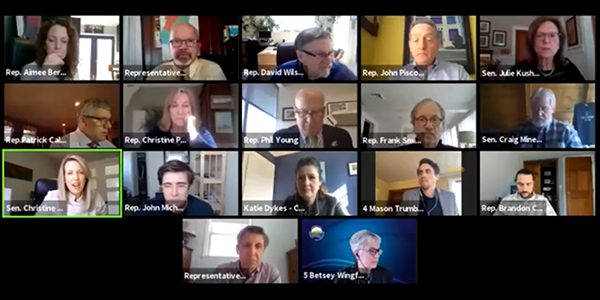A bill working its way through the Connecticut General Assembly seeks an increased review of siting proposals for solar facilities on certain farmlands and forests with more than 1 MW of generating capacity.
The Environment Committee listened to public testimony on the potential legislation as part of a 15-hour marathon hearing that addressed several bills on March 19.
One of the entities opposed to the siting legislation is the Connecticut Siting Council (CSC).
Melanie Bachman, executive director of the CSC, said she opposes the bill for the same reasons that the council opposed a similar measure passed four years ago. If passed, the proposed legislation’s language would repeal and replace a part of the statute from the 2017 version.
Bachman said CSC has exclusive authority over the siting of energy facilities with more than 1 MW of generating capacity. The proposed scope of the new bill, according to Bachman, would erode CSC discretion, increase project costs, thwart state clean energy goals and impact private property rights.
She added that regardless of the generating capacity of a proposed solar facility, the review process is the same. CSC must consult with 12 state agencies, including Energy and Environmental Protection (DEEP), Agriculture and Public Health.
“Naturally, competing interests exist among the state agency policies,” Bachman said. “CSC must strike a balance among these competing interests. The effect of this bill would tip the scale.”
The bill also seeks a decommissioning bond for approved solar facilities. Bachman said the required bond would not apply equally to all facilities and does not specify the bondholder. Most solar facilities are sited on private property and then leased by solar developers. The property owner, as opposed to the developer or state, has the legal rights to control decommissioning and the amount of any bond for associated costs.
DEEP Commissioner Katie Dykes said plans to imminently launch “a robust stakeholder engagement process” will ensure that the process for siting and permitting solar facilities is “transparent, efficient and predictable.” Dykes said potential policy conflicts and challenges could be “addressed, minimized and planned for” via the stakeholder process.
The bill, if enacted, would also increase the number of docket proceedings the CSC will need to manage and process with an expanding siting scope.
Dykes said because CSC already requires a decommissioning plan as an element of any facility approval and specifies a timeframe following the end of operations, requiring a bond of 25-30 years would be “an expensive and speculative requirement” that could influence the demand for renewable energy projects in Connecticut.
Reaction from Advocates, Trade Groups
Nathan Frohling, director of external affairs for The Nature Conservancy, offered conditional support for the bill based on the assurance that the decommissioning bond “does not unreasonably and differentially treat solar development relative to other forms of possible development on the same sensitive land.”
Frohling said a more substantial effort needs to be made to find and pursue plans providing guidance and incentives for siting grid-scale solar, so that development proceeds at the pace needed to meet climate goals while assuring the protection of critical lands environmental resources.
Mike Trahan, executive director of Solar Connecticut, said his group opposes the bill because “the facts show there is no need” for it.
“The fact is solar developers, and solar development, are not threats to farmland,” Trahan said. “Certainly, there’s no reason we can’t work together to achieve common ground.”
Frank DeFelice, chair of the Durham Planning and Zoning Commission and Regional Planning Commission for the Lower Connecticut River Valley Council of Governments, said renewable energy projections are vital with Connecticut’s retail electricity prices being the highest in the nation outside of Hawaii and Alaska. He added that solar installations are a lifeline to farmers, especially lease payments from solar developers.
Francis Pullaro, executive director of RENEW Northeast, had the last word at the end of a 15-hour hearing. Pullaro said he supports the proposed stakeholder engagement process.
“We think it’d be really helpful to bring farmland interests and renewable energy interests together,” he said.



